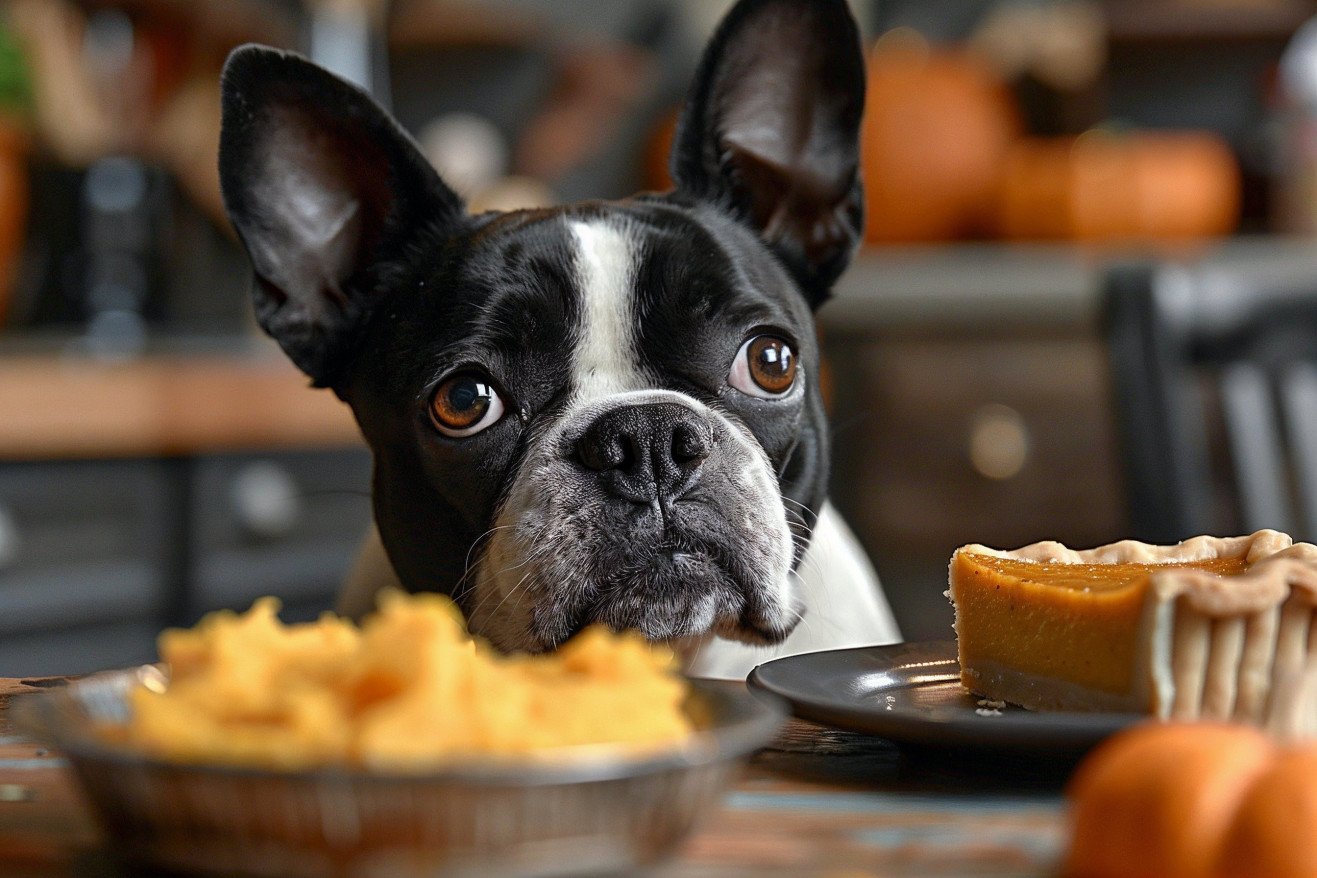Can Dogs Have Pumpkin Pie? Safe Treats for Your Pet Explained
13 March 2024 • Updated 12 March 2024

While pumpkin pie is a classic autumnal dessert, it’s probably not a good idea to give any to your dog. Not only is pumpkin pie high in sugar, but it also contains spices like nutmeg, which is toxic to dogs. While plain pumpkin is safe for dogs in small amounts, the fillings used in pumpkin pies often include unhealthy additives like xylitol, which can be fatal to dogs.
In this article, we’ll explore information from veterinarians, nutritional data, and research on the dietary habits of dogs to help you better understand the potential risks and benefits of giving pumpkin pie to your dog.
We’ll also take a closer look at the ingredients in pumpkin pie and how they can impact your dog’s health, and we’ll wrap up by discussing some healthy dietary options for your dog. Our goal is to offer a comprehensive, evidence-based resource that can help you better understand which treats are safe and how you can best support your dog’s well-being.
Can dogs have pumpkin pie?
Hidden Dangers: The Ingredients in Pumpkin Pie That Are Toxic to Dogs
Although pumpkin pie is a classic fall dessert for people, there are a few ingredients that can be toxic to dogs.
Nutmeg, which is often used to spice pumpkin pie, contains myristicin, a compound that is poisonous to dogs. According to the Pet Poison Helpline, dogs that have ingested myristicin may exhibit symptoms such as hallucinations, disorientation, tachycardia, abdominal pain, and seizures.
Another ingredient, xylitol, is an artificial sweetener that is commonly used in the “sugar-free” or “low-sugar” versions of many products, including pumpkin pie. The FDA explains that xylitol is highly toxic to dogs and can cause a rapid decrease in blood sugar and liver failure. Symptoms of xylitol poisoning can include vomiting, weakness, difficulty walking, collapse, and seizures.
Even if pumpkin pie doesn’t contain xylitol, the high sugar content can still be dangerous for dogs, leading to obesity and dental problems. If your dog has eaten pumpkin pie, it’s important to get them to a veterinarian right away.
Call the ASPCA Animal Poison Control or your local emergency veterinary clinic for help. To avoid these scary outcomes for our pets, make sure that toxic ingredients are kept out of the way of dogs so that everyone can enjoy the holiday treats safely.
Why Canned Pumpkin Is a Superfood for Dogs
While pumpkin pie is not a good idea for your dog, plain canned pumpkin is a superfood that can have a big impact on your dog’s health. Canned pumpkin is full of dietary fiber, which is great for your dog’s digestive system. It can help with diarrhea and constipation, according to the American Kennel Club.
The Ontario Veterinary College Pet Nutrition Update also says that pumpkin can be a good source of healthy fiber that can help with regular bowel movements.
Pumpkin is also full of important vitamins like A, C, and E, potassium, and antioxidants, which can help support your dog’s immune system, eye health, skin health, and overall well-being. Dogs Naturally says that pumpkin is full of beta-carotene, which is good for your dog’s eyes, immune system, and skin and coat health.
That said, it’s important to feed your dog canned pumpkin in moderation. Veterinary nutritionists say that too much pumpkin can lead to nutrient imbalances and digestive issues, according to Dr. Dan Su. Make sure you’re feeding your dog plain canned pumpkin with no added sugar or spices, and talk to your vet about the right amount to feed your dog.
When used responsibly, canned pumpkin can be a great, healthy treat that dog owners can feel good about.
How Sugar Affects Dogs
While sugar is an energy source, it can also have negative effects on dogs. Dogs that eat a lot of sugar can experience obesity and dental issues, which are similar to the effects of sugar in humans.
A study that was shared by Holiday Barn Pet Resorts even found that there are many of the same negative health effects in dogs that are associated with high sugar intake in humans, including obesity, hormonal imbalances, and diabetes.
Meanwhile, the simple carbohydrates in human treats can cause spikes in blood sugar that can lead to metabolic changes and an increased risk of diabetes.
The need for carbohydrates in a dog’s diet is a topic of much discussion. According to Trupanion, while dogs don’t need carbohydrates, they are a source of energy. However, many dog owners have adopted a “grain-free” diet for their dogs because they believe that excess carbohydrates are stored as fat and are therefore unnecessary.
Meanwhile, the study that was published in Sugar in Dog Foods found that dogs have a preference for sweet flavors, which is likely a result of their history of eating human food.
Healthy sugar alternatives include fruits and natural sweeteners like honey, both of which are safe for dogs in moderation. It’s important for pet parents to watch their dogs’ sugar intake and choose treats that offer nutritional value. Meanwhile, dog owners can make sure that their pets are getting a well-rounded, healthy diet by choosing lower glycemic treats and working with a vet.
How to Create a Healthy Diet for Your Dog
A healthy diet is essential for supporting your dog’s health and well-being. As omnivores, dogs have adapted to get the nutrients they need from both plant and animal sources. According to VCA Animal Hospitals, a healthy dog diet should include essential nutrients like proteins, fats, carbohydrates, vitamins, and minerals that are appropriate for the dog’s life stage.
The Association of American Feed Control Officials (AAFCO) has established standards to make sure that commercial dog foods contain these nutrients.
If you’re going to add human food to your dog’s diet, it’s important to know which foods are safe and which are dangerous. For example, lean meats, some vegetables, and grains can be healthy additions to your dog’s diet, while chocolate, grapes, and xylitol are toxic. PetMD notes that you should also consult your vet because your dog’s breed, size, and life stage may require a special diet.
You can make sure your dog eats a healthy diet by resisting the urge to feed them toxic human foods and sticking to high-quality commercial dog food or veterinarian-approved homemade meals. And don’t forget to give your pet access to fresh, clean water, which the ASPCA says is important for their overall well-being.
If you follow these tips, you can make sure your dog eats a healthy diet that will help them live a long, happy life.
Dog-Friendly Treats: Healthy Alternatives to Pumpkin Pie
If you want to give your dog a special treat, there are many other healthy options to pumpkin pie. You can still show your dog you care in a way that’s fun and healthy by making your own treats.
For example, you can make sweet potato pumpkin bites or peanut butter pumpkin biscuits, both of which combine pumpkin with other ingredients that are safe for dogs. As Victoria Moore explains, these treats can be a low-calorie way to get nutrients and are easy to make at home.
The American Kennel Club has recipes for dog treats that don’t include the unhealthy additives found in store-bought treats. Making your own treats also allows you to have more control over your dog’s diet and make treats that can cater to specific dietary needs, as well as offer a range of flavors and textures.
Of course, it’s important to remember that everything should be given in moderation. When you introduce new treats, do it slowly and watch for any signs of an adverse reaction.
Also, be sure to talk to your vet before adding any of these treats to your dog’s diet to make sure they are a good fit for your dog’s nutritional needs. If you take these steps, you can make sure you’re giving your dog treats that are both delicious and good for them, helping to keep them healthy and happy.
Final Thoughts: Sugar and Sweets
While pumpkin pie may be a sign of the holiday season for us, for dogs, it’s a veritable minefield of potential health problems when it comes to being used as a treat. From the spices that are toxic, like nutmeg, to the sweeteners like xylitol, to the sugar, there’s nothing in pumpkin pie that’s good for dogs.
That said, plain pumpkin is a healthy alternative that can help with digestive issues and provide essential vitamins and minerals when used in moderation.
This look at the impact of sugar in the diet has shown that it can lead to obesity, dental problems, and metabolic issues. This emphasizes the need for responsible feeding, avoiding foods that are high in sugar, and understanding a dog’s nutritional needs.
When it comes to being a pet parent, it’s important to keep learning about dog nutrition and to keep talking to your vet about your dog’s needs. With this knowledge, we can share the good things in life, including treats, with our pets. Let’s honor our dogs by choosing healthy, nutritious treats that meet their needs and help them enjoy the holidays without putting them at risk.


